Young Spaniard powers away from breakaway featuring Mathieu van der Poel to claim stage win and race lead
CHARONTONNAY, France — Young Spanish rider Ivan Romeo delivered a masterclass in tactical racing on Tuesday, powering away from a star-studded breakaway to claim victory on stage 3 of the Critérium du Dauphiné while simultaneously seizing the race leader’s yellow and blue jersey.
The 21-year-old Movistar rider’s triumph came on a day that began as a celebration of retiring French cycling icon Romain Bardet in his hometown of Brioude, but evolved into a fierce 207.2-kilometer battle featuring more than 3,000 meters of elevation gain and a rolling finish in Charantonnay.
Romeo’s victory was far from guaranteed in a breakaway that included cycling heavyweights Mathieu van der Poel and rising German star Florian Lipowitz. The young Spaniard, already the reigning UCI Under-23 Individual Time Trial World Champion, had been eyeing this stage for weeks.
“To be honest, I don’t believe this! I need to see pictures of myself with the yellow jersey for it to actually sink in,” Romeo said after his emotional victory. “I’ve actually had this stage on my mind for a month now, since training in Sierra Nevada with the team. I’m very grateful to them for giving me this chance.”
The stage began with 153 riders lining up in Brioude, where local hero Bardet (Picnic PostNL) received warm tributes from his hometown as he prepares to retire at the end of the week. After ruling the first two days of racing, favorites Tadej Pogačar and sprint stage winner Jonathan Milan would face a different challenge on the mountainous terrain that promised to be “a most intense battle.”
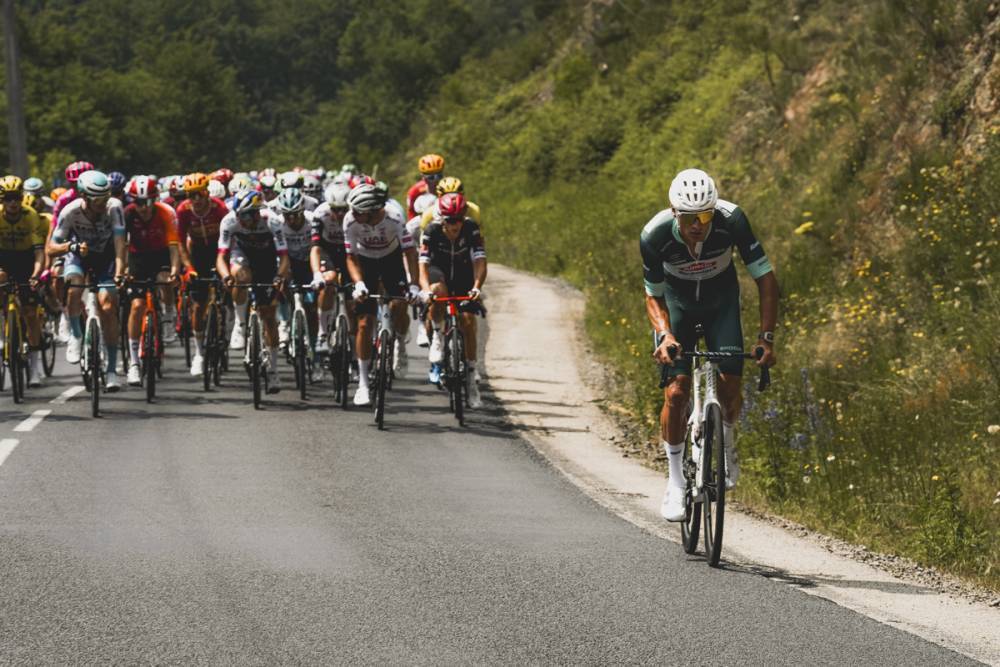
The tactical blueprint for the day became clear immediately: as cycling wisdom dictates, “there are no preparation races, and no transition days,” and the aggressive riders quickly recognized their opportunity. Van der Poel, the Dutch superstar leading Alpecin-Deceuninck, initiated the day’s warfare with a flurry of attacks on what the race organization had identified as “beautiful launchpads” for escapees. The category-3 Côte de Cornille at kilometer 8.9 and the category-2 Côte de la Barbate at kilometer 18 provided exactly that—early testing grounds that would determine who had the legs for the 207.2-kilometer odyssey ahead.
“This morning we thought the breakaway would have a chance, and that’s what happened despite having Florian Lipowitz in our group,” van der Poel reflected. “I took a gamble on this stage, but it was difficult to win.”
The intense early pace proved tactically decisive, halving the size of the peloton and eliminating key players from contention. Milan, wearing the leader’s jersey, was among the casualties, along with polka-dot jersey holder Paul Ourselin and strong climbers Ben Healy, Guillaume Martin-Guyonnet, and Magnus Sheffield. The selection was swift and brutal—exactly what aggressive racing was designed to achieve on terrain featuring “more than 3,000 metres of elevation” with a demanding “uphill start.”
At the intermediate sprint in La Chaise-Dieu, Pogačar and Remco Evenepoel managed to collect bonus seconds—four for the Slovenian, two for the Belgian—while Louis Barré launched another attack that would prove pivotal. After several waves of counter-attacks, a formidable 13-rider leading group emerged.
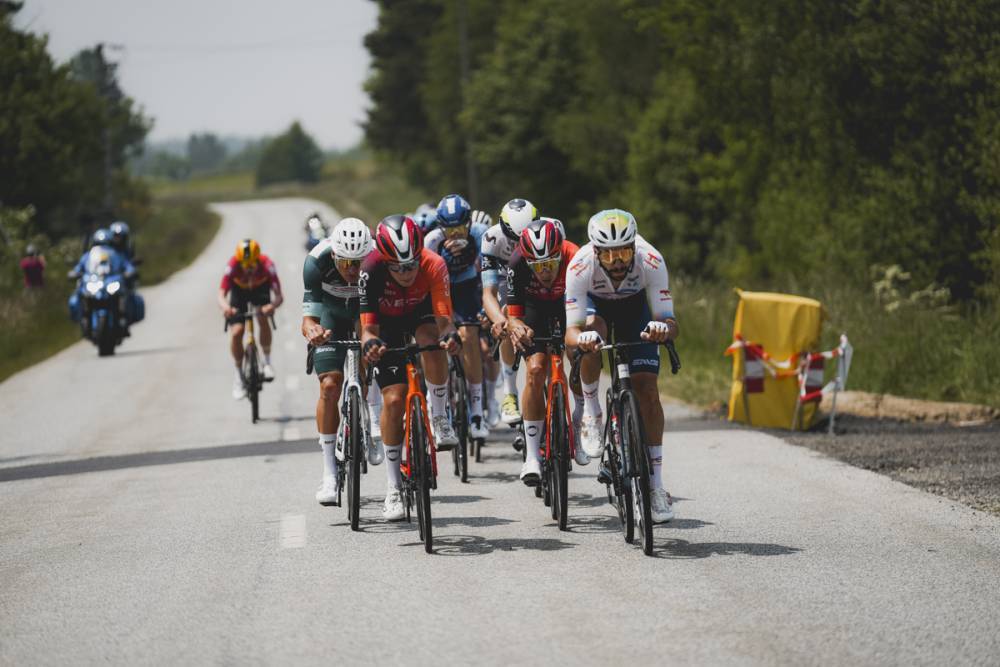
The breakaway featured an impressive roster: Axel Laurance, Michael Shea Leonard of Ineos Grenadiers, Romeo, Brieuc Rolland of Groupama-FDJ, Lipowitz from Red Bull-Bora-Hansgrohe, Julien Bernard of Lidl-Trek, Harold Tejada of XDS Astana, van der Poel, Andreas Leknessund of Uno-X Mobility, Ed Dunbar of Jayco AlUla, Barré of Intermarché-Wanty, and Anthony Turgis of Total Energies.
The presence of van der Poel, sitting just two seconds behind in the overall classification, transformed this from a standard breakaway into a genuine threat that demanded immediate tactical response. The peloton’s strategic calculus was complicated further by other general classification contenders in the move: Lipowitz, who finished second in Paris-Nice 2025, Romeo, fourth in the UAE Tour 2025, Dunbar, 11th in last year’s Vuelta with two stage wins, and Tejada, eighth in Paris-Nice. These weren’t merely opportunistic escapees—they were legitimate contenders capable of defending significant time gaps.
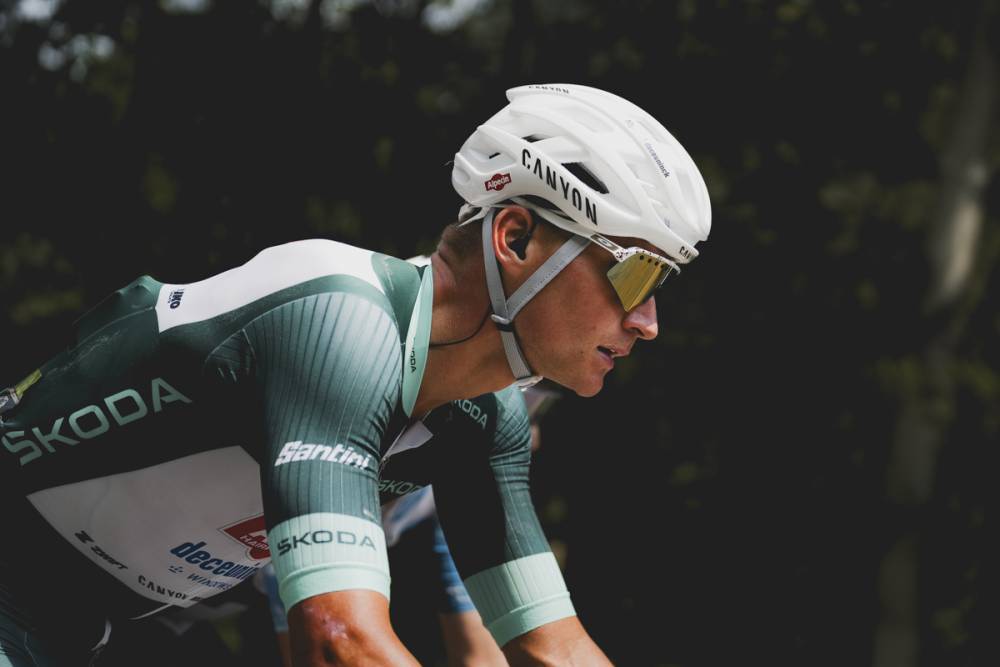
Recognizing the danger, the general classification teams abandoned any thoughts of letting the break ride freely. Pogačar’s UAE Team Emirates-XRG, Evenepoel’s Soudal Quick-Step, and Vingegaard’s Visma-Lease a Bike formed an unusual alliance, working together to control the tempo. Their tactical discipline kept the gap manageable, peaking at just 2 minutes 35 seconds at kilometer 73—tight enough to maintain pressure but not so close as to discourage the breakaway’s collaboration.
The tactical endgame began at the base of the category-3 Côte du Château Jaune, where the peloton’s relentless pursuit had reduced the gap to a precarious 50 seconds. The climb’s specifications—1.2 kilometers at 9.2 percent average gradient with sections “over 10%” and positioned just 19 kilometers from the finish—made it the perfect launching pad for the breakaway’s final selection.
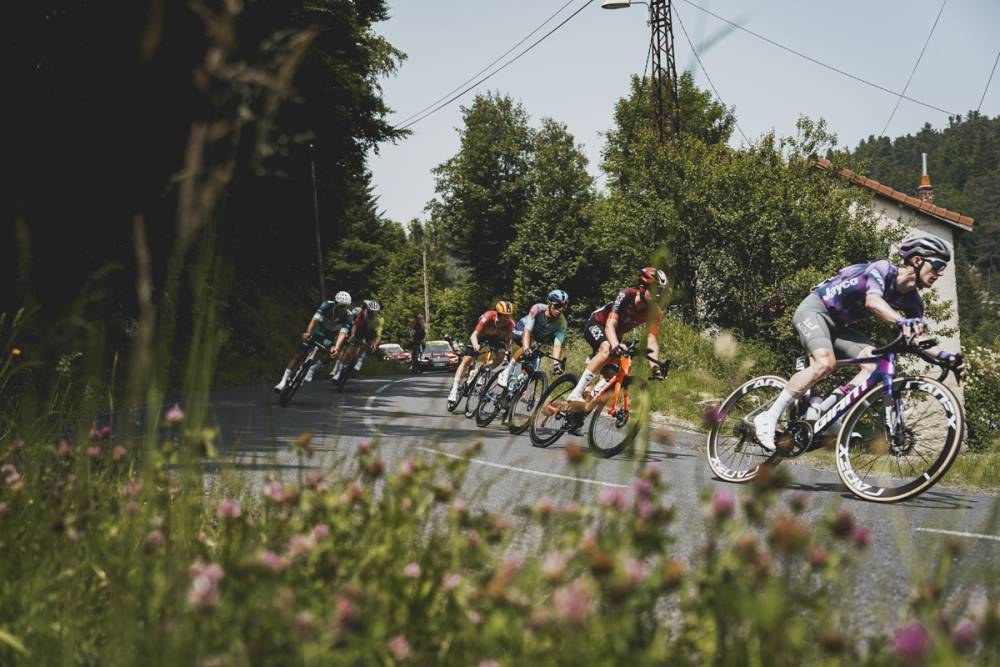
Lipowitz, representing Red Bull-Bora-Hansgrohe’s tactical ambitions, “put the hammer down at the bottom of the climb,” immediately fracturing the 13-rider group. His attack was surgical in its timing and devastating in its effect, creating the first significant selection within the breakaway itself. Over the summit, only Tejada, Bernard, and Leknessund had managed to follow the German’s fierce pace.
The tactical chess match continued as van der Poel and Barré bridged across with 13 kilometers remaining, their experience and tactical acumen allowing them to time their effort perfectly. Romeo, Laurance, Dunbar, and Rolland completed the regrouping with 11 kilometers to go, reforming a dangerous 10-rider selection while the gap to the increasingly distant peloton expanded back to 1 minute 15 seconds.
Romeo’s winning move came with six kilometers to go, and his tactical patience proved decisive. “It was already so hard to get in the breakaway and I didn’t feel really good when I was in there. So I waited for the last moment,” he explained. “I know I have good instinct in this kind of finale. When the others didn’t chase me for a minute or so, I knew I just had to go flat out until the end.”
The Spaniard’s solo effort carried him to victory 14 seconds ahead of Tejada, Barré, and Lipowitz, while the main peloton finished 1 minute 6 seconds behind.
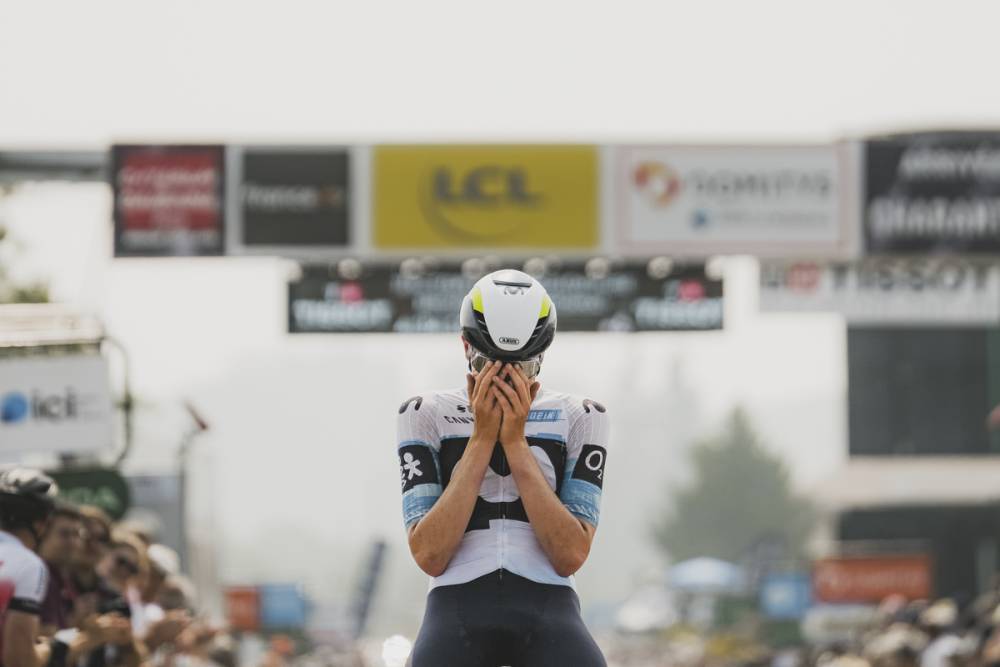
Van der Poel, despite his aggressive racing throughout the stage, acknowledged the difficulty of the finale. “There were a lot of us in the finale and each time it was up to me to react to the acceleration, but that’s normal after all,” he said. “To succeed in this kind of scenario, I’d have had to have extraordinary legs. But with everything I’d given up just to stay in the breakaway, that wasn’t the case any more.”
Romeo’s victory represents a significant breakthrough in what he describes as a rebuilding process. “Hard work always pays off and today it was the case. It’s been hard to return to a good shape after a good start of the season but now I think I can say I did,” he said.
When asked about comparisons to fellow young Spanish star Carlos Alcaraz, Romeo showed his humor alongside his ambition: “I’m nowhere close to Carlos Alcaraz,” he laughed. “He’s won five grand slams, I’ve won two professional races. But I’ll try to catch him!”
The victory positions Romeo perfectly for Wednesday’s individual time trial from Charmes-sur-Rhône to Saint-Péray, a 17.4-kilometer test against the clock where his credentials as the reigning Under-23 world champion in the discipline could prove decisive.
Van der Poel, meanwhile, reflected positively on his racing despite missing out on victory. “All in all, I’ve got three good results, but I’d have preferred to win just one and finish a long way back on the others,” he said. “In any case, these first few days have been very positive, and what I’m looking for here in terms of sensations is impossible to find in training.”
The stage served as a poignant reminder of cycling’s generational transitions, beginning with tributes to the retiring Bardet and ending with Romeo’s breakthrough victory. As the race heads into its crucial time trial stage, the young Spaniard finds himself in the enviable position of wearing yellow while possessing the skills to defend it against the clock.
Stage 3 Results
| Rank | Rider | Team | Time | Gap | Bonus |
| 1 | Ivan Romeo Abad | Movistar Team | 04:34:10 | – | 10″ |
| 2 | Harold Tejada | XDS Astana Team | 04:34:24 | +00:14 | 6″ |
| 3 | Louis Barre | Intermarché-Wanty | 04:34:24 | +00:14 | 7″ |
| 4 | Florian Lipowitz | Red Bull-Bora-Hansgrohe | 04:34:24 | +00:14 | – |
| 5 | Mathieu van der Poel | Alpecin-Deceuninck | 04:34:37 | +00:27 | – |
| 6 | Axel Laurance | Ineos Grenadiers | 04:34:37 | +00:27 | – |
| 7 | Brieuc Rolland | Groupama-FDJ | 04:34:37 | +00:27 | – |
| 8 | Julien Bernard | Lidl-Trek | 04:34:37 | +00:27 | – |
| 9 | Andreas Leknessund | Uno-X Mobility | 04:34:37 | +00:27 | – |
| 10 | Edward Dunbar | Team Jayco ALula | 04:34:37 | +00:27 | – |
General Classification After Stage 3
| Rank | Rider | Team | Time | Gap | Bonus |
| 1 | Ivan Romeo Abad | Movistar Team | 14:09:01 | – | 10″ |
| 2 | Louis Barre | Intermarché-Wanty | 14:09:18 | +00:17 | 7″” |
| 3 | Harold Tejada | XDS Astana Team | 14:09:19 | +00:18 | 6″ |
| 4 | Florian Lipowitz | Red Bull-Bora-Hansgrohe | 14:09:25 | +00:24 | – |
| 5 | Mathieu van der Poel | Alpecin-Deceuninck | 14:09:30 | +00:29 | 8″ |
| 6 | Edward Dunbar | Team Jayco ALula | 14:09:38 | +00:37 | – |
| 7 | Brieuc Rolland | Groupama-FDJ | 14:09:38 | +00:37 | – |
| 8 | Andreas Leknessund | Uno-X Mobility | 14:09:38 | +00:37 | – |
| 9 | Tadej Pogačar | UAE Team Emirates XRG | 14:10:07 | +01:06 | 12″ |
| 10 | Alfred Wright | Bahrain Victorious | 14:10:13 | +01:12 | 6″ |

